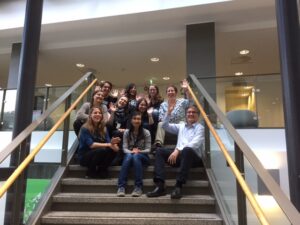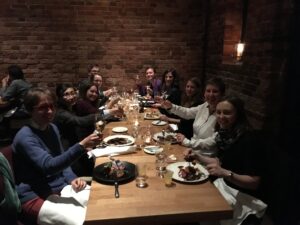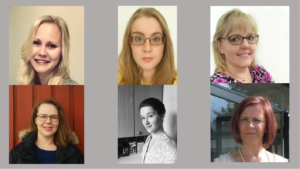 The EXCELC team caught up in Helsinki last week (5 – 6 October) to discuss progress to date with the EXCELC project and the next steps for the study.
The EXCELC team caught up in Helsinki last week (5 – 6 October) to discuss progress to date with the EXCELC project and the next steps for the study.
On Thursday, the EXCELC team discussed progress with the service user and carer fieldwork in Austria and Finland. Birgit Trukeschitz, Assma Hajji, Judith Kieninger and Judith Litschauer reported that they have nearly completed the Austrian fieldwork (with only a few interviews left) and presented descriptive results. Ismo Linnosmaa, Lien Nguyen and Hanna Jokimaki finished their data collection for the Finnish fieldwork and also presented descriptive results. We discussed various options for analysing the data collected from the fieldwork and constructed a workplan with several streams of analysis. After the meeting, the Finnish team led us on a walking tour of Helsinki and gave us the opportunity to try some delicious Finnish cuisine sourced entirely from Finnish suppliers!

On Friday, Laurie Batchelder and Eirini Saloniki presented results from the preference study, which included models for England for the ASCOT carer measure and models exploring the effect of preference elicitation methods on preferences for the ASCOT service user measure. Birgit Trukeschitz and Assma Hajji from the Austrian team and Ismo Linnosmaa, Lien Nguyen and Hanna Jokimaki from the Finnish team presented preference models for their respective countries. The team discussed the strategies and selection criteria used to choose the best fitting models and outlined the robustness checks needed before the results were ready for publication. The meeting ended by outlining proposed plans for each of the workpackages. Here’s to another productive and enjoyable meeting!
Category: News
Excelc in OPTIMI
 A short article by Professor Ismo Linnosmaa and Dr Eirini Saloniki has recently been published in the OPTIMI. OPTIMI is a newsletter in health and social economics concentrating on recent research and findings about productivity, effectiveness, costs, finance and incentives in health and social care in Finland. The newsletter disseminates recent research findings to support decision-making at various levels of health and social care. OPTIMI is published four times a year and it is edited at the Centre for Health and Social Economics, National Institute for Health and Welfare, Helsinki. To read the article please follow this link.
A short article by Professor Ismo Linnosmaa and Dr Eirini Saloniki has recently been published in the OPTIMI. OPTIMI is a newsletter in health and social economics concentrating on recent research and findings about productivity, effectiveness, costs, finance and incentives in health and social care in Finland. The newsletter disseminates recent research findings to support decision-making at various levels of health and social care. OPTIMI is published four times a year and it is edited at the Centre for Health and Social Economics, National Institute for Health and Welfare, Helsinki. To read the article please follow this link.
The EXCELC project: the interviewers’ experiences of encountering home care clients in Finland
 By the Finnish EXCELC-team (National Institute for Health and Welfare)
By the Finnish EXCELC-team (National Institute for Health and Welfare)
During Autumn 2016 and Spring 2017, six EXCELC-project research assistants visited home care clients and their informal caregivers across many cities in Finland. They interviewed them about their everyday life, use of home care and other themes related to long-term care services. During the fieldwork, the interviewers met very different kinds of people and have had a chance to listen to their life stories. This blog shares the experiences of the Finnish interviewers.
The interviewees considered the study important
In general, we were warmly welcomed by the interviewees in their homes. Sometimes the interview started with coffee that was set ready for the visitor.
Many interviewees told us that they considered the study to be important and therefore wanted to participate in it. They were pleased to hear that the National Institute for Health and Welfare (THL) is conducting the study and were satisfied that their voice would be heard through their participation in the interview. Informal caregivers often made significant arrangements to make the interview happen. For example, a caregiver who was living in another municipality, came to care for an older relative on her day off, assisted with the interview and agreed to be interviewed herself.
Respondents were motivated despite long interviews
The health of the home care clients and their informal caregivers we interviewed varied widely. Some were in very good mental and physical health while others were very ill. The questionnaires used in the interviews are quite long and demanding, and the duration and burdensomeness of the interview was a lot to take in for many interviewees. Nevertheless, only a few interviews had to be finished incomplete, although to complete some of them we needed to come back on several occasions. For the most part interviewees rarely took breaks, except to sip some coffee every now and then.
The questions of the ASCOT quality of life measure were challenging for most interviewees and the questionnaire as a whole was seen as quite burdensome, demanding and long. Even so, most interviewees were motivated to respond to the questionnaire. It was important for home care clients to reply themselves to the questions and to bring out their own thoughts although in some cases the informal caregiver had to act as a proxy respondent because of the health state of the home care client. After many interviews, we feel that people generally had a need to talk about their affairs, which may explain why people were happy to keep going through the questionnaire despite its length.
Loneliness of home care clients touched the interviewers
The interview situations have been important for both interviewers and interviewees. The stories told by the older people we interviewed have been very moving. Stories of interviewees in very poor health, in particular, are etched into our memories.
Hearing of the loneliness suffered from by home care clients and encountering veterans and their spouses has been very moving. Many of us had not spoken before to people who had fought in wars. Alongside this sadness, however, there was also a lot of joy in people’s lives: for example, where the home care user has a close family that cares for them. In many interviews the conversations were cheerful, with laughter and people expressing hope for the future.
A unique experience and an opportunity to encounter different people
We have often stayed some time after the “formal part” of the interview had finished to talk to the interviewee about issues relating to either home care or other unrelated topics. The interviews and these more general discussions have been useful for both parties. The hundreds of interviews already carried out have given us a valuable insight into the performance of the elderly home care service system.
Many interviewees were grateful for the life they have lived and for the services offered by the welfare state. Although they sometimes criticized the service system, many older people were grateful for the services that are provided to them. For us, we have had a chance to hear various stories about respondents’ lives, regarding such as war time, loneliness, illness and hopefulness. Despite the challenges, it has been a unique experience and an opportunity to meet different people.
This blog contains thoughts and experiences on the interviews conducted in Finland. It has been written by six research assistants who conducted the interviews. Susanna Nevalainen wrote the manuscript after collecting thoughts and ideas, while Tuula Kontio, Miina Nikkanen, Maarit Ojanen, Iris Pykäläinen and Helena Rovamo contributed to it as commentators.
 The field work is an important part of the EXCELC project. The project target is that the research assistants will interview almost 700 people in Finland: home care clients and their carers. Interviews are conducted in the cities of Helsinki, Espoo, Vantaa, Kuopio, Joensuu, Mikkeli, Kainuu Social Welfare and Health Care Joint Authority (Kainuun sote), South Karelia Social and Health Care District (Eksote), Tampere, Hämeenlinna, Lahti and Vaasa. The interviewers were given training before they began with their work and regular meetings have been held with them to discuss the fieldwork progress and challenges related to the work. Interviews are usually done at homes of home care clients and their informal caregivers. Interviews with home care clients have varied in length, about 1.5 to 4.5 hours; while those with caregivers have been generally slightly shorter. ASCOT quality of life measures are used in the study.
The field work is an important part of the EXCELC project. The project target is that the research assistants will interview almost 700 people in Finland: home care clients and their carers. Interviews are conducted in the cities of Helsinki, Espoo, Vantaa, Kuopio, Joensuu, Mikkeli, Kainuu Social Welfare and Health Care Joint Authority (Kainuun sote), South Karelia Social and Health Care District (Eksote), Tampere, Hämeenlinna, Lahti and Vaasa. The interviewers were given training before they began with their work and regular meetings have been held with them to discuss the fieldwork progress and challenges related to the work. Interviews are usually done at homes of home care clients and their informal caregivers. Interviews with home care clients have varied in length, about 1.5 to 4.5 hours; while those with caregivers have been generally slightly shorter. ASCOT quality of life measures are used in the study.
“It’s hard to imagine situations that you’ve not experienced before properly:” Reflections on what aspects of quality of life people value using the Best-Worst Scaling (BWS) Task
Recently our team published a research note on the work we undertook to understand people’s preferences for different quality of life states described by the ASCOT service user and carer measures. The method we used to draw out people’s preferences for quality of life states was a task called Best-Worst Scaling (BWS). During this task, we asked participants to trade-off and choose different care-related quality of life states.
We wanted to make sure that the presentation of the BWS task was clear before it was presented in the mainstage study, so we tested the BWS task in a small group of people in England, Austria and Finland. We asked them to reflect on everything they were thinking and feeling while completing the BWS task. We also interviewed these people after the task in order to better understand their decision-making processes.
This research note sets out our key findings and highlights some problems we encountered when we tested this method, along with how we overcame these problems. These changes have now been piloted, and we have just completed the main fieldwork, collecting people’s preferences for ASCOT quality of life states.
We are currently using the data we have collected about how people understand the BWS experiment to look in more detail at how people make decisions about their preferences. This will help us to better understand the data we collected from the BWS task and to plan future experiments. It will also provide us a better understanding of the BWS task overall. We presented this work at the ILPN conference at LSE in September 2016 (see link to our presentation at ILPN here and also Storify of the ILPN conference here) and further discussed these findings at the NORFACE Workshop: Health Politics, Health Policy, Long-Term Care and Inequalities in October 2016 in Mannheim, Germany.
Next year we will provide a further update – some results from the analysis of the BWS data from England, Austria and Finland.
Read more about this study here!


